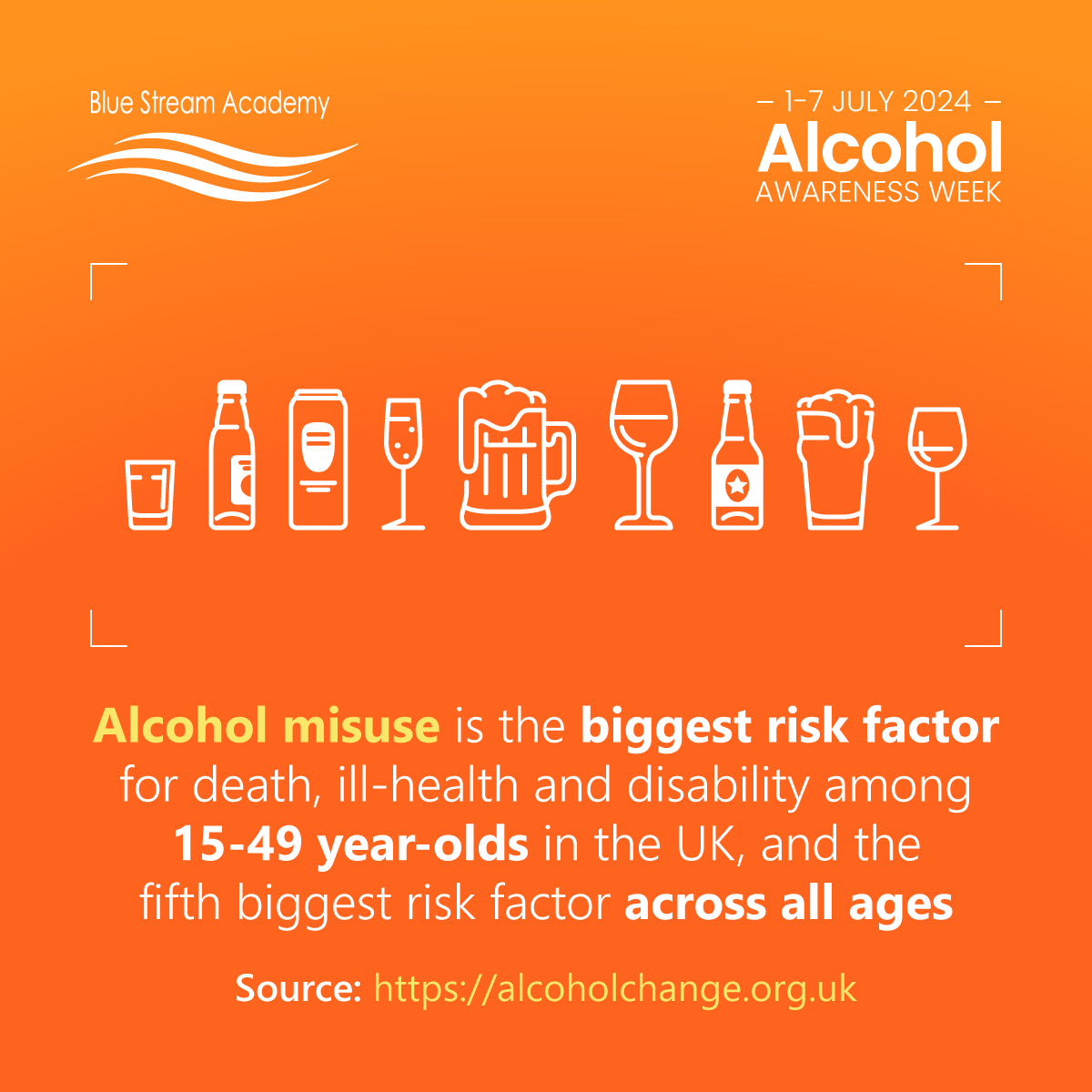7/2/2024 9:28:59 AM
Alcohol Awareness Week 2024 | Healthcare Awareness & Training

Do you understand the harm of alcohol?
Every year, Alcohol Change UK hosts Alcohol Awareness Week – a UK-wide campaign to get people thinking about drinking, whilst raising awareness of the impact of alcohol and campaigning for change.
From 1 – 7 July 2024, this years Alcohol Awareness Week is orientated around Understanding Alcohol Harm.
Understanding the detrimental effects of alcohol is crucial, as its misuse can lead to a multitude of health problems including liver disease, heart issues, mental health disorders, and an increased risk of accidents and injuries. Alcohol is not only a personal health issue but also a social one, impacting families, workplaces, and communities. Raising awareness about these harms is essential for fostering a more informed and responsible approach to alcohol consumption.
During Alcohol Awareness Week, various initiatives and activities are designed to educate the public about the risks associated with alcohol misuse. This includes seminars, workshops, and outreach programs that provide valuable information on how to recognise the signs of alcohol dependency, how to seek help, and how to support loved ones struggling with alcohol-related issues. By participating in these events and spreading the message, we can collectively work towards reducing the harm caused by alcohol and promote a healthier society.
"Alcohol misuse is the biggest risk factor for death, ill-health and disability among 15-49 year-olds in the UK, and the fifth biggest risk factor across all ages."
Source: Alcohol Change UK
Given these alarming statistics, it's clear that alcohol misuse is a pressing public health issue that requires our attention and action. Various healthcare organisations have a crucial role to play in mitigating this problem. By undertaking alcohol awareness training, GP practices, health and social care providers, hospices, dental practices, aesthetics clinics, and urgent & private care providers can make significant strides in supporting the understanding of alcohol harm.
What Can Healthcare Organisations do to Support Alcohol Awareness and the Understanding of Alcohol Harm?
GP practices serve as the frontline of healthcare and are often the first point of contact for individuals seeking medical assistance. By undertaking alcohol awareness training, GP surgeries and their staff can better identify early signs of alcohol misuse and provide timely interventions. This can prevent the progression of alcohol-related health issues, thereby reducing the burden on the healthcare system. GPs can also incorporate regular alcohol screenings in routine check-ups and provide patients with educational resources on the risks associated with excessive drinking.
Health and social care providers work closely with vulnerable populations, making their role in alcohol awareness critical. These providers can observe the social and environmental factors that contribute to alcohol misuse and intervene appropriately. Training in alcohol awareness enables them to educate individuals and families about the dangers of excessive drinking, provide support, and connect them with necessary resources. By promoting healthy relationships with alcohol, health and social care providers can help foster safer and healthier communities.
Hospices, which focus on providing compassionate care to individuals facing life-limiting illnesses, also benefit significantly from alcohol awareness training. Understanding the effects of alcohol on patients' health can improve the quality of care provided. Hospice staff can address alcohol use issues with sensitivity, ensuring that it does not exacerbate existing conditions or hinder the effectiveness of treatments. This holistic approach to care can greatly enhance the quality of life for patients in their final stages.
Dental practices, often overlooked in the context of alcohol misuse, play a vital role in identifying and addressing alcohol-related oral health issues. Excessive alcohol consumption is linked to various dental problems, including gum disease and oral cancer. Dentists trained in alcohol awareness can educate their patients on these risks, encourage healthier drinking habits, and refer those in need to appropriate support services. This proactive approach can prevent serious oral health issues and promote overall well-being.
Aesthetics clinics, which cater to individuals seeking cosmetic treatments, can also contribute to alcohol awareness. Alcohol misuse can have detrimental effects on skin health and overall appearance. By undertaking alcohol awareness training, aesthetics professionals can educate their clients on the impact of alcohol on their skin and overall health, promoting a balanced approach to drinking. This can lead to better treatment outcomes and support clients in achieving lasting beauty and wellness.
Finally, urgent and private care providers, who often deal with acute health issues, can greatly benefit from understanding the role of alcohol in various medical conditions. Alcohol awareness training enables these providers to quickly identify alcohol-related problems and offer appropriate care. In emergency situations, this knowledge can be critical in providing immediate and effective treatment. Additionally, these providers can offer follow-up care and referrals to support long-term recovery and health, ensuring a comprehensive approach to patient care.
In summary, alcohol awareness training across these diverse healthcare sectors is essential for fostering a comprehensive understanding of alcohol harm. By equipping professionals with the necessary knowledge and skills, we can collectively work towards reducing the negative impact of alcohol on individuals and society. Each organisation has a unique role to play in promoting healthy alcohol relationships and supporting the overall well-being of the communities they serve.
How Can I Access Blue Stream Academy’s Alcohol Awareness Healthcare Training?
Click here to contact Blue Stream Academy's friendly team for more information on the Drug and Alcohol Awareness eLearning module.